

NLM Copyright Information. Attribution and Rights for Government Works: Works produced by the U.S. government are not subject to copyright protection in the United States.
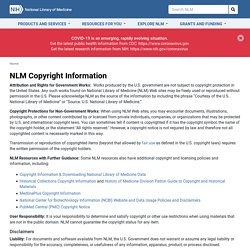
Any such works found on National Library of Medicine (NLM) Web sites may be freely used or reproduced without permission in the U.S. Please acknowledge NLM as the source of the information by including the phrase “Courtesy of the U.S. National Library of Medicine” or “Source: U.S. National Library of Medicine.” What Is a Copyright? - FindLaw. Created by FindLaw's team of legal writers and editors| Last updated July 23, 2019 Copyright is a form of intellectual property protection provided by the laws of the United States.

Copyright protection is available for original works of authorship that are fixed in a tangible form, whether published or unpublished. The categories of works that can be protected by copyright laws include paintings, literary works, live performances, photographs, movies, and software. Fear of Missing Out impacts people of all ages. By Sara Zaske, WSU News PULLMAN, Wash. – Social media addicted teenagers are not the only people who experience the Fear of Missing Out also known as FoMO.
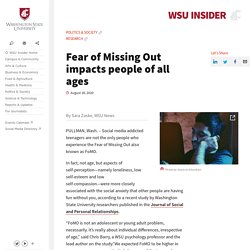
In fact, not age, but aspects of self-perception—namely loneliness, low self-esteem and low self-compassion—were more closely associated with the social anxiety that other people are having fun without you, according to a recent study by Washington State University researchers published in the Journal of Social and Personal Relationships. “FoMO is not an adolescent or young adult problem, necessarily.
It’s really about individual differences, irrespective of age,” said Chris Barry, a WSU psychology professor and the lead author on the study. 10 Things You Need To Know About Online Reputation Management. By Carolyn O'Hara Ever wish you could scrub embarrassing college pics from Facebook?
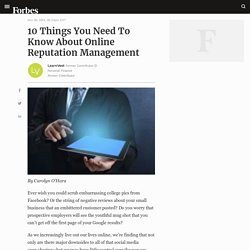
Or the string of negative reviews about your small business that an embittered customer posted? Do you worry that prospective employers will see the youthful mug shot that you can’t get off the first page of your Google results? As we increasingly live out our lives online, we’re finding that not only are there major downsides to all of that social media over-sharing—but we may have little control over the way we appear on the internet. A person who wants to do damage to your reputation will find few obstacles online, easily tarnishing your good name. Enter online reputation managers. Part PR gurus, part tech experts, they specialize in providing online makeovers—often by burying negative search results and promoting content that accentuates a client’s desired image. So what exactly does a reputation management specialist do? Michael Fertik: Our customers range from moms and dads to Fortune 500 companies.
Online Reputation - The What, The How and The Why. Online reputation is a concept we often use, but without really knowing how to take control of it, as it is impacted by so many factors, from a brand's activity on social networks to the interactions with readers, users, etc.
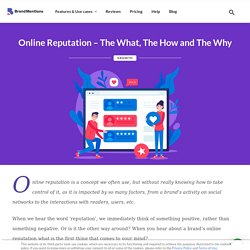
When we hear the word 'reputation', we immediately think of something positive, rather than something negative. Or is it the other way around? When you hear about a brand’s online reputation what is the first thing that comes to your mind? To remove any ambiguity, let’s focus on understanding online reputation first. Let's jump straight to the action! 1. Online reputation is the image that a brand, product or service has on the internet (web and digital platforms). The online reputation is impacted by the inside information the brand shares as well as by users’ interaction. Often time, customer reviews, news and facts about the brand weigh more than what the brand communicates and promotes.
Your brand reputation determines how people perceive your brand. Cyberbullying: What is it and how to stop it. 3.
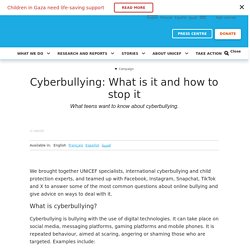
Who should I talk to if someone is bullying me online? Why is reporting important? If you think you’re being bullied, the first step is to seek help from someone you trust such as your parents, a close family member or another trusted adult. In your school you can reach out to a counsellor, the sports coach or your favourite teacher. And if you are not comfortable talking to someone you know, search for a helpline in your country to talk to a professional counsellor.
If the bullying is happening on a social platform, consider blocking the bully and formally reporting their behaviour on the platform itself. It can be helpful to collect evidence – text messages and screen shots of social media posts – to show what’s been going on. What Is Cyberbullying. El ciberacoso es el acoso que tiene lugar en dispositivos digitales, como teléfonos celulares, computadoras y tabletas.
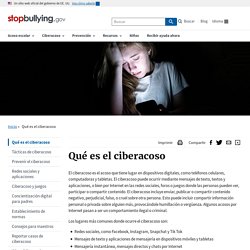
El ciberacoso puede ocurrir mediante mensajes de texto, textos y aplicaciones, o bien por Internet en las redes sociales, foros o juegos donde las personas pueden ver, participar o compartir contenido. Writing in the Disciplines: History. Interview with Sydney Watts, Ph.D.

It is no surprise that college writing differs from writing in high school, but many students who take history courses find that writing for history is difficult. Professors often see many mistakes in student writing, and here are a few of the most common to consider first: Not answering the specific question being askedOffering generalities and platitudes, saying very big, broad statementsNarration or description without analysisNot using primary and secondary sources to understand change over time However, these mistakes can be easily fixed if a student knows what they are and understands how to avoid them.
Here are interviews with University of Richmond History Professor Dr. Common Mistakes History Professors See in Student Writing Key Points: "If you find yourself just describing events instead of asking yourself why they happened or how they happened, you're probably on the wrong track. " UNE - Academic Writing - Plagiarism.